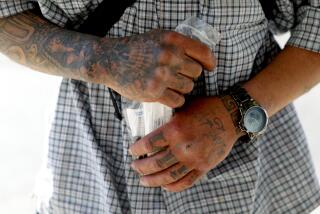Survey Finds Many Are Misinformed on Access to ‘Morning-After’ Pill
- Share via
Most women in California are not aware that they can obtain the emergency contraceptive known as the morning-after pill without a prescription, although it has been available at some pharmacies for the last year, according to a new study by the Henry J. Kaiser Family Foundation.
California is one of five states that permit pharmacists to dispense the drug, called Plan B, without a doctor’s prescription. Women must request it, because it is not sold over the counter like aspirin.
So far only about 18% of pharmacies in California provide the drug, although 45 of the 58 counties in the state have at least one pharmacy dispensing it, the study found. Only 9% of women ages 15 to 44 know about it, and about 135,000 women have actually received the drug in California, according to the report.
The study also found that many women confused it with the abortion drug mifepristone, also known as RU-486.
“What this really highlights is how challenging it is” to educate women about emergency contraception,” said the study’s lead author, Alina Salganicoff. When they know about the option, however, most women want it, she added.
A box of Plan B contains a packet of two high-dose oral contraceptives. The first pill must be taken with 72 hours -- and preferably within 24 hours -- after unprotected intercourse. The drug prevents the implantation of a fertilized egg in the uterus -- the medical definition of pregnancy.
In one study, when women took the first pill within 72 hours of having unprotected sex and then took the second pill 12 hours later, the drug was 89% effective.
According to the new study, 65% of women said they would be likely to take Plan B if they already had it on hand at home.
The U.S. Food and Drug Administration’s scientific advisors recommended in December that Plan B be sold without prescription nationwide, calling it a safe and important way to decrease the number of abortions.
The FDA has received no reports of deaths among women who have taken the morning-after pill, agency officials said. The most common side effects of the drug are nausea, headache and fatigue.
Kathy Kneer, president and chief executive of Planned Parenthood Affiliates of California, said her group hopes that one day every woman who needs it will have a supply of emergency contraceptives at home.
The Right to Life League of Southern California says, however, that Plan B can cause harmful side effects and psychological problems
“Our major [concern] is the medical health of the women. I think if they really knew about it, they wouldn’t use it anyway,” said league Executive Director Bernadette Gonzalez.
In rare cases, some women may experience severe abdominal pain a few weeks after taking the drug. If it was taken too late and did not prevent a pregnancy, that pain could be a symptom of an ectopic pregnancy, a life-threatening condition.






